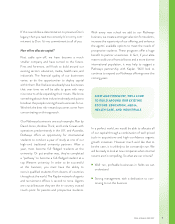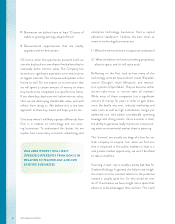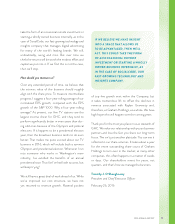Washington Post 2015 Annual Report Download - page 19
Download and view the complete annual report
Please find page 19 of the 2015 Washington Post annual report below. You can navigate through the pages in the report by either clicking on the pages listed below, or by using the keyword search tool below to find specific information within the annual report.program or makes another substantive program change. Provisional certification does not otherwise limit access
to Title IV program funds by students attending the institution. On December 17, 2015, Kaplan University
received notice from the ED that it had been placed on provisional certification status until September 30, 2018,
in connection with an open and ongoing ED program review. The ED has not notified Kaplan University of any
negative findings. However, at this time we cannot predict the outcome of the program review. During the period
of provisional certification, Kaplan University must obtain prior ED approval to open a new location, add an
educational program, acquire another school or make any other significant change.
In addition, if the ED finds that a school has failed to comply with Title IV requirements or improperly disbursed
or retained Title IV program funds, it may take one or more of a number of actions, including fining the school,
requiring the school to repay Title IV program funds, limiting or terminating the school’s eligibility to participate
in Title IV programs, initiating an emergency action to suspend the school’s participation in the Title IV
programs without prior notice or opportunity for a hearing, transferring the school to a method of Title IV
payment that would adversely affect the timing of the institution’s receipt of Title IV funds, requiring the
submission of a letter of credit, denying or refusing to consider the school’s application for renewal of its
certification to participate in the Title IV programs or for approval to add a new campus or educational program
and referring the matter for possible civil or criminal investigation. There can be no assurance that the ED will
not take any of these or other actions in the future, whether as a result of a lawsuit, program review or otherwise.
This list is not exhaustive. There may be other actions the ED may take and other legal theories under which a
school could be sued as a result of alleged irregularities in the administration of student financial aid. See
Item 1A. Risk Factors, including Failure to Comply With Statutory and Regulatory Requirements Could Result
in Loss of Access to U.S. Federal Student Loans and Grants Under Title IV, a Requirement to Pay Fines or
Monetary Liabilities or Other Sanctions.
Student Default Rates. A school may lose its eligibility to participate in Title IV programs if student defaults
on the repayment of Title IV loans exceed specified rates, referred to as “cohort default rates.” The ED calculates
a cohort default rate for each OPEID number. Kaplan University will be the only OPEID unit that will be
continuing operations through 2016. If a school’s cohort default rate exceeds 40% for any single year, it will lose
its eligibility to participate in the Direct Loan programs for at least two fiscal years, effective 30 days after
notification from the ED. If a school’s cohort default rate equals or exceeds 30% for three consecutive years, it
will lose its Title IV eligibility to participate in the Direct Loan and U.S. Federal Pell Grant programs effective
30 days after notification from the ED and will remain ineligible for at least two fiscal years. If a school’s cohort
default rate equals or exceeds 30% in two of the three most recent fiscal years for which rates have been issued
by the ED, it may be placed on provisional certification by the ED.
The three-year cohort default rates for Kaplan University, the only OPEID unit that will be continuing operation
through the end of 2016, for the U.S. Federal fiscal years ending September 30, 2012, 2011 and 2010, were
12.9%, 20.4% and 26.2%, respectively.
Because KHE receives a significantly lower level of taxpayer-funded grants and subsidies than community
colleges, state schools and not-for-profit schools, KHE’s schools are more dependent on tuition, and its students
are more dependent on loans.
Kaplan has dedicated resources to help students who are at risk of default. Kaplan personnel contact students and
provide assistance, which includes providing students with specific loan repayment information, lender contact
information and debt counseling. Kaplan has also implemented a financial literacy and counseling program for
current students and provides career counseling services. In addition, Kaplan implemented the Kaplan
Commitment program in 2010, which provides first-time undergraduate students with a risk-free trial period.
Students who withdraw or are subject to dismissal during the risk-free trial period do not incur any significant
financial obligation. However, no assurances can be given that these resources or programs will enable Kaplan’s
schools to maintain cohort default rates below the thresholds for sanctions.
2015 FORM 10-K 4
























